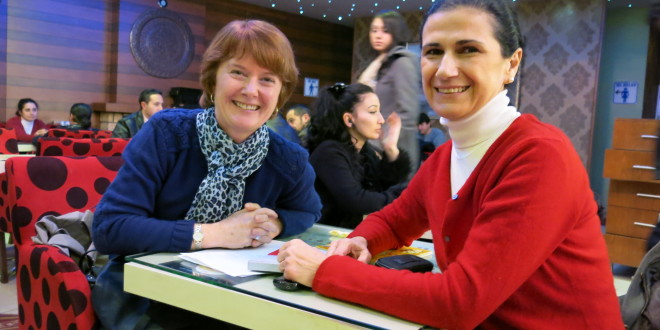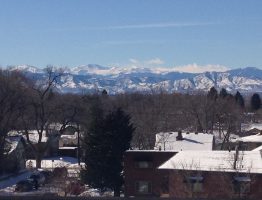This is an excerpt from my upcoming memoir . . .
Our upcoming relocation was no longer breaking news. The machinery of the move had started up, the most visible effect our now-empty living room. We had packed and sent personal effects, including a sofa and three upholstered chairs to Turkey. They would be at sea for about three months, arriving in Istanbul in June, 2010.
My focus had narrowed. Business-like, I dug into the many tasks at hand—putting together an air shipment, changing mailing and billing addresses, renewing my passport, and starting to learn some Turkish words. For the time being, I ceased contemplating how Turkish life might agree with me.
Three times each week after breakfast, I put on padded headphones with an attached microphone, and sat down at my computer. After logging in, I heard the pleasant voice of Fatma, my new Turkish teacher. “Iyi gunler, Susan. Nasilsiniz?” Good day, Susan. How are you?
Fatma, a resident of North Carolina, was brought to me in real time by Berlitz. I could not only hear her via the headphones, but I could also see the movement of her cursor on my screen. After greeting me, Fatma asked me to greet her. Then she brought up a set of pictures on my monitor and pointed at them, asking me for their names in Turkish.
When I got an answer correct, Fatma would exclaim, harika (HAAA ree kah), excellent. I loved that word, and worked hard so that I could hear it again and again from her. It had been easy to learn the word, harika. But unfortunately, less emotionally-saturated vocabulary resisted settling into my mind. Turkish words seemed to hit my middle-aged cranium and bounce right back off, only to gear up for another assault the next time I had a lesson.
Fatma spent over a week pointing at numbers from one to ten and saying, Bu iki? (Is this two?) Bu beş? (Is this five?) Bu sekiz? (Is this eight?) It was only after dozens of repetitions that I could remember these basic numbers, and altı, six, would remain a problem.
One day I decided to use all the Turkish words I had learned thus far—both from Fatma and from my visit to Istanbul—to write a poem. Word choice was easy with such a limited number to choose from. My attempt, heavy on foods and numbers, was fun to read aloud:
–Bir, iki, ooch
(One, two, three)
–Orhan Pamuk
(Turkish Nobel Laureate)
–SaBANji, KAHvey, doeNAIR
(university name, coffee, grilled lamb dish)
–JaDAYsee, lowKOOM, isKANder
(boulevard, Turkish delight, lamb dish)
–Kebab, AYran, dunYAHsuh
(kebab, salty yogurt drink, world)
–Simit, chai, chorBAsuh
(sesame ring, tea, soup)
–BILgee, dort, guNIGHdun
(information, four, good morning)
–Lost final sezon
(seen on billboards all over Istanbul in January, 2010)
Despite mastery of these words, I was having difficulty adding to my vocabulary. Why? Was I simply too distracted by moving details? Was it that the meanings were, unlike Spanish, seldom easy to guess? I was beginning to realize that my Spanish skills, a long-standing source of pride, were due in great part to the large number of Spanish-English cognates.
Or was it my age, the decreasing plasticity of my brain? I hadn’t sat down to study a new language since I was 24 years old. That was in 1979.
I was also having trouble retaining Turkish history. I had now read several accounts of Byzantine and Ottoman times, but the information hadn’t coalesced into any kind of clear, mental narrative. When people asked me about Turkish history, all I could do was proclaim my recent discovery: that the country used to be Christian, but now was Muslim.
Founding Father
If I couldn’t yet comprehend Turkey’s ancient past, maybe I could get a handle on its most recent century. On a list of recommended reading in the back of my guidebook, I discovered a book called Crescent and Star: Turkey at the Crossroads by Steven Kinzer. Kinzer had recently served as New York Times Istanbul bureau chief. Also listed was a memoir called Turkish Reflections, by Mary Lee Settle. Settle was the first woman to win an American Book Award. I ordered both books from Amazon.
Success! Kinzer’s writing on Turkey’s twentieth century drew me right in. In fact, I found myself reading lengthy, detailed chapters in one sitting. The new information involved topics like World War I and European colonial designs on the Middle East, which were already familiar to me. It went down—or, I should say, went in—easily.
I learned that I was headed for a Muslim republic whose founding father had declared, “I have no religion and at times I wish all religions at the bottom of the sea.” That would be Mustafa Kemal, the man known as Atatürk.
I learned that it is impossible to overstate Atatürk’s importance to modern Turkey.
At the start of World War I, concerned about British and French domination of the Middle East, Turkey threw its support behind Germany. This miscalculation hastened the Ottoman Empire’s demise. As the Great War ended, representatives of Sultan Mehmet VI signed a treaty with Great Britain, France, and Italy, allowing Turkey to be carved into British, French, Italian, and Greek spheres of influence.
British warships entered the Bosphorus, putting Istanbul under international control. France took over land near its new Syrian colony, and Italy moved across Turkey’s Mediterranean coast. Greece, promised Turkey’s western provinces by the British, seized Thrace and the Aegean coastline.
Mustafa Kemal, a blonde, blue-eyed army commander from Salonika in Ottoman Greece, disagreed. Esteemed for successfully defending Turkey’s Gallipoli peninsula, Kemal defied the ruling sultans, dashing around the country by horse and train, rousing an impoverished, defeated population.
People defending their own soil can accomplish what seems impossible. In 1922, the Turkish army led by Kemal managed to drive Greek forces down from the central Anatolian plateau, where they had overreached, back to Turkey’s westernmost city of Smyrna (known today as Izmir). Kemal’s forces then set fire to the city, literally pushing the Greeks into the sea. It was a horrific massacre, with hundreds of people drowning or burning to death. And it caused the Allies to relinquish their claim on Turkish territory.
Turkey had successfully resisted dismemberment. In 1923, with a mandate from an adoring nation, Mustafa Kemal became the Turkish Republic’s first president. He renamed himself Kemal Atatürk, the latter meaning “father of all Turks.”
With bad memories of punitive teachers at his Islamic primary school, and revulsion over the subservience of Turkey’s sultan to Western powers, Atatürk abolished the centuries-old Islamic caliphate. He elevated the Turkish military and moved the country’s capital from Istanbul, a city reminiscent of the debauched sultans, to Ankara, in the Anatolian heartland. Long an admirer of French modernity and advancement, he changed the Turkish alphabet from the Arabic to the Latin script, replying to his mostly illiterate constituents, “You will learn it in two weeks.”
The Hagia Sofia, formerly the largest church in Christendom, had served as a mosque since the Muslim conquest of 1453. In 1935, Atatürk proclaimed it a site of world heritage, and turned it into a museum.
Church and State
One might think that the Atatürk era, relatively free of religious strictures, was tolerant and liberal. But, perhaps because of the existential threat the country had just faced down, it was characterized by an emphasis on Turkish identity. Ethnic Greeks born in Turkey were sent back to Greece in a population exchange. The teaching of indigenous languages such as Kurdish, and the granting of non-Turkish names to babies was forbidden. A Kurdish independence movement was quashed. Minorities such as Alevis and the few Armenians that remained after their mass extermination a decade earlier under the Ottomans, were marginalized. No longer a multi-ethnic empire, Turkey became a nation of a single homogenous identity.
Atatürk replaced the Islamic calendar with the European one, and proclaimed Sunday the weekly holiday. Rather than pulling church and state apart, he turned them on their head, putting religious affairs under state control. He banned the fez, leading to protests in which 200 men died, and the headscarf, long part of Turkish peasant dress. He forbade people wearing these from entering government buildings, including public schools.
I would soon witness the extent to which Turks revered Atatürk. Kinzer describes today’s Turkey as remarkable, a place where it is perfectly acceptable to be non-religious, to never darken the door of a mosque or learn how to pray. Turks commonly drink rakı (an unsweetened, anise-flavored alcoholic drink), dance with members of the opposite sex and dress as those in the West. Kinzer feels it is one of the marvels of Turkey that the country is officially 98% Muslim, yet offers its people such a range of lifestyle choices.
Most of this can be traced back to Atatürk, and most of it is positive. But to Atatürk, the proper Turk was one in whose life religion plays little or no role. He considered believers superstitious people who held their country back. This Kinzer believes, marginalized over half the Turkish population. Kinzer feels that government actions such as writing sermons for imams, and excluding women who wear headscarves from high schools and universities violated freedoms of speech and privacy:
“In every culture that has existed over the entire course of human history, people have sought answers to the great mysteries of existence. Invariably they turn to religion. . . Wise leaders, even the most atheistic among them, know they must balance the sacred and secular impulses in their societies. Those who governed the Turkish Republic for the first eighty years of its existence were unable or unwilling to strike that balance. This led many Muslims to conclude that they had to choose between their religious faith and allegiance to the state. No state has ever prevailed in such a confrontation.” page 59-60
Hmm. “No state has ever prevailed.” Ominous words! Kinzer’s ideas complemented my understanding of human nature. It seemed to me that treating religious people unfairly—anywhere in the world—was asking for trouble. Was I heading to a country where a kind of vengeful payback was about to occur? I would read other books about modern Turkish history, but Kinzer’s was the only one that viewed its religious politics from a purely human perspective. As for Turkish Reflections, Mary Lee Settle simply stated that, “Atatürk went too far with religion.”
I had several family members who disdained the U.S. government. I couldn’t help asking one, “How would you feel if the American government decided to write the sermons you hear in church?” I received a look of incredulous disbelief.
The Western press called Turkey’s current leader “mildly Islamic.” I already knew that not all Turks liked him. During our look-see visit we had asked our driver, Aras, about the man, Prime Minister Recep Tayyip Erdoğan. Aras had first glanced around the restaurant we were lunching in. Then, lowering his head and speaking softly, he had confided that, “Erdoğan is trying to turn Turkey into Iran.”
What to make of this, sitting in my Minnesota living room? It seemed odd that a Muslim country would restrict the religious rights of Muslims. I had thought that in Muslim countries, Islam affected nearly every aspect of life. Now I realized that, at least in the case of Turkey, I was wrong.
The new information was intriguing, a refreshing change from my country’s wrangling over health care reform. It put American problems into perspective: another country was perhaps more divided than mine! And the fact that my mind was finally allowing something in was exhilarating. I guess for me, Turkey’s recent history was as emotionally charged as the word, harika.
Sankar left for Istanbul at the beginning of March, eager to begin work. It amused me that he was moving so enthusiastically to a Muslim country. Raised Hindu, he had witnessed sporadic Hindu-Muslim strife in India, often quite serious. He had in the past described Muslims as inflexible, combative.
“I can’t believe you’re happy moving to a place that’s 98 percent Muslim.” I commented as I helped him fold clothes into his suitcase.
“Oh it’s no problem,” Sankar replied. “Turks are ‘Muslim Lite.’”
We laughed. I guessed I had Atatürk to thank for that.





Susan you have described history and present of Turkey so well that anyone who wishes to move to Turkey should read it. Except that it’s beeb 3 years I guess since you left Turkey and guess what the taxi driver is right. Turkey is getting more and more Islamic.
I loved reading what you gave written. HARIKA! One small remark about the numbers: altı is not seven but six 🙂
Thanks, Nazan, for your kind comments. I will never comprehend the number altı!